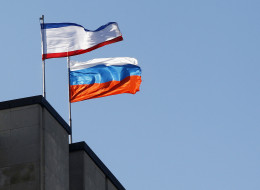There is a stark and obvious asymmetry in the Ukraine crisis. Russia will use military force to get its way. The West will not and should not. There is no doubt that Russian militarized bullying can lead to the de facto division of Ukraine, an event that would be of grave long-term consequences not only for Russia and Ukraine but for the world. The practical question at hand is whether international law can still function to stop this from occurring. In my view, the answer is yes.
The problem with international law is that the great powers, including both the US and Russia, give it allegiance opportunistically, only when it is to their short-term convenience. The US launched the Iraq War against international law. The US has recently destabilized many regimes against international law that protect the sovereignty of UN member states. The US is supporting a violent insurgency in Syria to bring down the regime against international law.
Now it is Russia's turn to violate international law. Russia's actions in the Crimea are perfectly intelligible in terms of Russia's interests and foreign policy traditions, but they are also clearly in violation of international law. Russia has high stakes in Ukraine, and the extra-constitutional toppling of Yanukovich was against Russian interests and provoked Russia's response in Crimea. The West should acknowledge Russia's valid economic and security concerns in Ukraine, but it should not accede to Russia's unilateral and illegal actions in Crimea (and still less if they spread to Eastern Ukraine).
The most important governing law in this immediate case is both explicit and extremely important. It is the treaty-backed agreement reached by four powers in 1994, Ukraine, Russia, the United States, and the United Kingdom, known as "The Memorandum on Security Assurances in connection with Ukraine's accession to the Treaty on the Non-Proliferation on Nuclear Weapons (NPT)." It is filed with the UN Security Council as S/1994/1399, on December 19, 1994.
The issue at hand in 1994 was as important as any issue of international law: the management of nuclear arms. Ukraine and Russia had just recently become independent after the demise of the Soviet Union in December 1991. Ukraine had inherited a nuclear arms stockpile. In the interest of nuclear non-proliferation and to prevent accidents, terrorism, or a nuclear showdown in the post-Soviet region, the US and Russia prevailed on Ukraine to give up its nuclear weapons and hand them to Russia.
The quid pro quo, at stake today, was Ukraine's territorial sovereignty. Ukraine gave up its nuclear weapons on the assurance that it would remain sovereign and secure, including from Russia. As Ukraine renounced nuclear weapons and joined the NPT, Russia, the US, and UK, "reaffirmed their commitment ... to respect the independence and sovereignty and the existing borders of Ukraine." Moreover, the parties reaffirmed:
their obligation to refrain from the threat or use of force against the territorial integrity or political independence of Ukraine, and that none of their weapons will ever be used against Ukraine except in self-defense or otherwise in accordance with the Charter of the United Nations;
As for threats of energy cutoffs or other economic sanctions, the parties reaffirmed:
to refrain from economic coercion designed to subordinate to their own interest the exercise by Ukraine of the rights inherent in its sovereignty and thus to secure advantages of any kind;
Crucially, the memorandum made clear that the four parties (including Ukraine) would "consult in the event a situation arises that raises a question concerning these commitments."
This international agreement is the basis for Russia to return to its base in Crimea, and for Crimea to remain part of Ukraine. It is the guarantee of Ukraine's territorial integrity and sovereignty. It is the bulwark against economic blackmail. In short, it is the place where peaceful nations must take their stand in the current crisis.
The United States should make the legal case, again and again, in the UN Security Council. It should explain the global agreements in detail to the American people, the UN member states, and the world. It should require that Russia explain its actions in light of its clear responsibilities to consult with Ukraine, not as a matter of good neighborliness, but as a matter of solemn international obligation.
There are three weaknesses in this approach. First, international law works slowly, while armaments and events move quickly. No doubt that is true. Second, and just as important, the US is a frequent violator of international law. Invoking it is a double-edged sword: Many US initiatives will be called into question (e.g. in Syria). Third, Russia is not especially lawyerly in its foreign policy. Yet its record of abiding by international treaties is actually much stronger than is widely known.
The West acted foolishly in Ukraine, thinking that a popular upheaval could sweep a pro-Russian government from power and yet not prompt a hostile Russian reaction. The EU was naïve in thinking it could spring Ukraine from Russian influence through a mere association agreement or a loan. Any government in Ukraine must pay attention to the security and economic interests of its powerful neighbor to the East. The West should not feed fantasies held by segments of Ukrainian society.
Yet the West should not accede to Russian demands. Upholding Ukraine's sovereignty is not just about Ukraine. It is about the non-proliferation treaty itself, and global safety in a nuclear-armed world.
Yet there can be no military response from the West. Analogies to Munich 1938 are not correct. In a nuclear world, Russia will not invade the West nor can the West triumph militarily over Russia.
Similarly, sanctions will not play any real role except dig both sides deeper into confrontation. Visa restrictions are less than pin pricks, signs of silliness not policy. The UN Security Council should insist on reason from Russia, and West should insist on reason and moderation from Kiev.
All sides will lose in a deepening confrontation and horrible mistakes would be possible. Russia's security interests should be respected, but Russia should abide by international law, and the US should do so in Syria and other areas of Russian concern. For the entire world, international law is the key to long-term survival. It may be a slender thread, but it is the only thread we have.

 This photo montage depicts morphogenesis from an initial homogeneous state (upper left, same volume and color) through a heterogeneous state (center, same volume but different colors) and into a chemo-physical heterogeneous state (lower right, different volumes and colors). This cellular differentiation takes place exactly as Alan Turing predicted it would in his 1952 paper "The Chemical Basis of Morphogenesis.'
This photo montage depicts morphogenesis from an initial homogeneous state (upper left, same volume and color) through a heterogeneous state (center, same volume but different colors) and into a chemo-physical heterogeneous state (lower right, different volumes and colors). This cellular differentiation takes place exactly as Alan Turing predicted it would in his 1952 paper "The Chemical Basis of Morphogenesis.'




